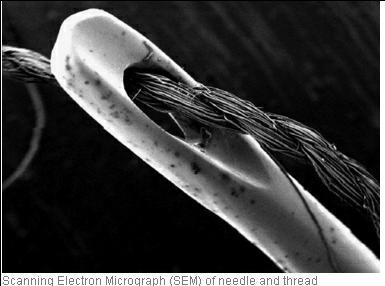The first human genome sequencing was accomplished after 13 painstaking years of research at the cost of $3 billion. But recent advances in sequencing technology holds promise of rapid increase in speed of sequencing at the rate of 6 billion nucleotide bases every 6 h at a cost below $1000.

SEM of needle and thread
A human genome comprises 3 billion nucleotide bases. Accomplishing successful sequencing at such economical costs will make this a pervasive technology that can then be made a part of every individual’s medical records paving the way for better understanding of diseases.
Nanopore sequencing technology has been around since the mid-1990s. Nanopores can generate electric current by conducting ions when they are submerged in a conducting fluid with a potential difference applied across them. The current which is proportional to the size and shape of the Nanopore, gets altered when a DNA thread is passed through the nanopore akin to a thread through the eye of a needle. This change in current translates to a reading of each nucleotide base. Nanopores have progressed from protein base to silicon materials. The technology has however been characterized by limitations in reading the nucleotide bases as they stream by too quickly through the Nanopore for any significant reading to be made. Research spearheaded by Stuart Lindsay, Director of Center for Single Molecule Biophysics at the Biodesign Institute, has succeeded in overcoming this limitation. Lindsay’s technique, which has been titled as Recognition Tunneling comprises of trapping a DNA nucleotide between a pair of gold electrodes with a span of a nanopore. The trapping is facilitated by means of molecules on the electrode that can bind the bases long enough for identification before releasing them to allow the DNA thread to carry on its journey through the nanopore.
The tunneling method of nucleotide identification is not only 90% accurate, but is also capable of identifying gene modifications caused by environmental factors.
Disclaimer: The views expressed here are those of the author expressed in their private capacity and do not necessarily represent the views of AZoM.com Limited T/A AZoNetwork the owner and operator of this website. This disclaimer forms part of the Terms and conditions of use of this website.